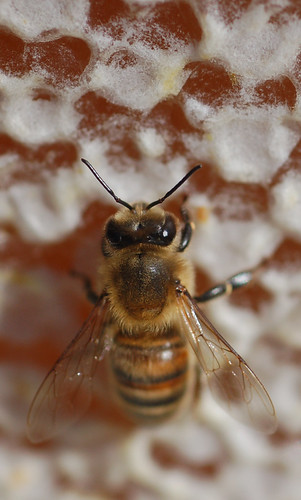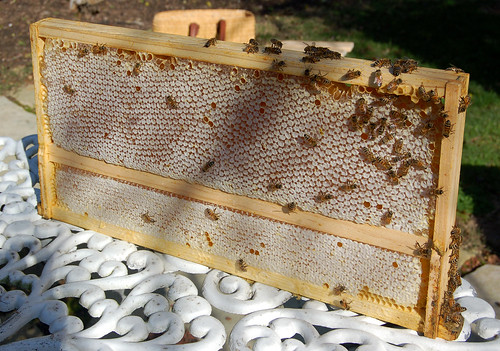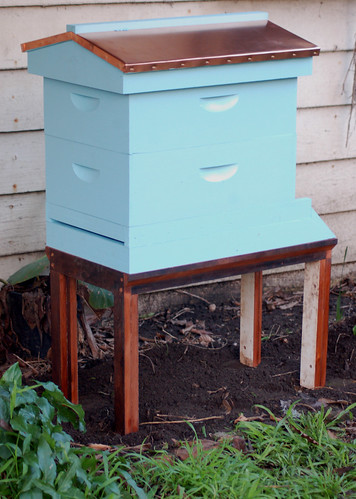A Taylor-Made Hive
...

Our friend Taylor keeps bees in her backyard in Alameda. They're remarkably mellow ladies. When Taylor heard that Robb and I wanted to start beekeeping, she generously offered to give us part of her colony.

Bees have a fascinating social structure (click for video), and one of the things that's particularly interesting is how in the spring, bees will often voluntarily divide their colonies. The reigning queen and half of her bees, will leave behind a safe home and all of the honey that they've worked so hard to create. They fly off in a group, and look for a new home. The remaining bees will breed a new queen, who will (hopefully) mate and carry on the life of the hive.
The fact that the queen leaves all the colony's resources behind strikes me as quite amazing. It seems really selfless, because -- other than what they're carrying in their stomachs -- the bees are leaving everything behind, to start a new life, and to let a new generation of bees inherit their home.

Dividing a colony of bees serves the same function as allowing the bees to swarm. Plus, it's less terrifying for the neighbors, and the beekeepeer gets the peace of mind of knowing that their bees will have been given a good home.

Since Taylor's frames were exactly the same size as ours, we were able to insert some of our frames into her hive. If everything goes well, the worker bees will start "drawing out" comb on the stamped wax foundation of our frames. The queen will lay eggs. And when things look good, we'll transfer our frame into our bee boxes, and drive them back to our house, where they'll hopefully take up residence in the beautiful new beehive that Robb bought me for Christmas.

(Isn't that gorgeous? Robb built the hive-stand with redwood planks we found buried in our back yard. You can't beat that old growth redwood for durability.)

Our friend Taylor keeps bees in her backyard in Alameda. They're remarkably mellow ladies. When Taylor heard that Robb and I wanted to start beekeeping, she generously offered to give us part of her colony.

Bees have a fascinating social structure (click for video), and one of the things that's particularly interesting is how in the spring, bees will often voluntarily divide their colonies. The reigning queen and half of her bees, will leave behind a safe home and all of the honey that they've worked so hard to create. They fly off in a group, and look for a new home. The remaining bees will breed a new queen, who will (hopefully) mate and carry on the life of the hive.
The fact that the queen leaves all the colony's resources behind strikes me as quite amazing. It seems really selfless, because -- other than what they're carrying in their stomachs -- the bees are leaving everything behind, to start a new life, and to let a new generation of bees inherit their home.

Dividing a colony of bees serves the same function as allowing the bees to swarm. Plus, it's less terrifying for the neighbors, and the beekeepeer gets the peace of mind of knowing that their bees will have been given a good home.

Since Taylor's frames were exactly the same size as ours, we were able to insert some of our frames into her hive. If everything goes well, the worker bees will start "drawing out" comb on the stamped wax foundation of our frames. The queen will lay eggs. And when things look good, we'll transfer our frame into our bee boxes, and drive them back to our house, where they'll hopefully take up residence in the beautiful new beehive that Robb bought me for Christmas.

(Isn't that gorgeous? Robb built the hive-stand with redwood planks we found buried in our back yard. You can't beat that old growth redwood for durability.)

Comments
Congrats one your new hobby-the beehive looks wonderful as do those bees. Looking forward to updates!
You knew someone was going to have to say it!
WE would still like to have a hive one day. Do the hives stand in the sun or shade, or a combination of both? We were thinking of having one next to our grape vines, but maybe it should be placed under it?
One of the reasons we considered having a bee hive is also because it can "bee" rented to all the different farmers around here for pollination purposes.
Annalisa
Stacey
You may be interested in the Rav group Lampyridae. It's relatively new, but there's some really well informed people in the group & I'm learning so much. One of the guys raises silk worms and has been sharing the process & photos with us. They're looking for people who have interest in insects,bees have been mentioned, gardening, botany, and the topics grow as people express interest in different things.